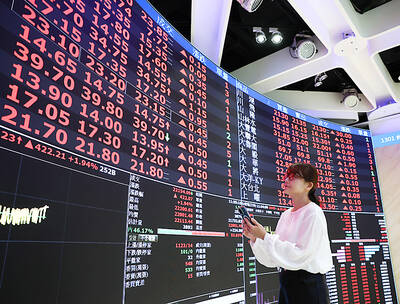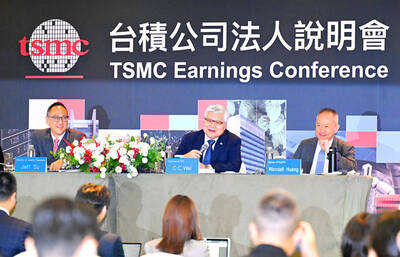China’s foreign exchange reserves, the world’s largest, climbed to a record US$1.81 trillion at the end of last month as regulators failed to stem inflows of speculative capital from abroad.
Currency holdings rose 35.7 percent from a year earlier, the People’s Bank of China said yesterday on its Web site. The assets grew by US$126.6 billion from the end of March after a US$153.9 billion gain, the biggest on record, in the first quarter.
Chinese regulators are adding controls this month to limit “hot money” inflows from investors who are betting that the yuan will continue to appreciate after 25 straight monthly gains. The trade surplus, foreign direct investment and speculative capital have flooded the world’s fourth-biggest economy with cash, threatening to stoke inflation that rose to a 12-year high in February.
“A huge amount of money is coming into China and betting on the Chinese currency,” said Dwyfor Evans, an economist at State Street Global Markets in Hong Kong. “This is creating an inflation impact and has become a big worry for policymakers.”
The yuan has climbed against the US dollar every month since May 2006.
Speculative inflows may have reached more than US$200 billion in the first five months, according to Michael Pettis, a finance professor at Peking University.
The extra cash is limiting the options of policymakers. The central bank has kept interest rates unchanged this year after six increases last year on concern that higher rates would only attract more money from abroad. Instead, it has quickened the yuan’s gains versus the dollar to double last year’s pace and ordered banks to set aside a record 17.5 percent of deposits as reserves.
More increases in the reserve requirement are likely and the central bank will also keep selling bills to soak up cash, Wang Tao, a Beijing-based economist with UBS AG, said in a July 2 report predicting “continued rapid accumulation of foreign-exchange reserves” this year.
The State Administration of Foreign Exchange, China’s currency regulator, said this month it would inspect exporter foreign-exchange settlements starting from yesterday to try to prevent sham transactions letting speculative capital in.
China is also drafting regulations to control cross-border payments for services, with the same aim, according to an official at the regulator, who wouldn’t be identified.
Besides inflow of money, the currency reserves are swelled by returns on investments and a US dollar slump that increases the value of holdings in other currencies.
The government last year set up an investment arm, China Investment Corp (中國投資), to invest some of the money for bigger returns.

UNCERTAINTIES: Exports surged 34.1% and private investment grew 7.03% to outpace expectations in the first half, although US tariffs could stall momentum The Chung-Hua Institution for Economic Research (CIER, 中華經濟研究院) yesterday raised its GDP growth forecast to 3.05 percent this year on a robust first-half performance, but warned that US tariff threats and external uncertainty could stall momentum in the second half of the year. “The first half proved exceptionally strong, allowing room for optimism,” CIER president Lien Hsien-ming (連賢明) said. “But the growth momentum may slow moving forward due to US tariffs.” The tariff threat poses definite downside risks, although the scale of the impact remains unclear given the unpredictability of US President Donald Trump’s policies, Lien said. Despite the headwinds, Taiwan is likely

READY TO BUY: Shortly after Nvidia announced the approval, Chinese firms scrambled to order the H20 GPUs, which the company must send to the US government for approval Nvidia Corp chief executive officer Jensen Huang (黃仁勳) late on Monday said the technology giant has won approval from US President Donald Trump’s administration to sell its advanced H20 graphics processing units (GPUs) used to develop artificial intelligence (AI) to China. The news came in a company blog post late on Monday and Huang also spoke about the coup on China’s state-run China Global Television Network in remarks shown on X. “The US government has assured Nvidia that licenses will be granted, and Nvidia hopes to start deliveries soon,” the post said. “Today, I’m announcing that the US government has approved for us

The National Stabilization Fund (NSF, 國安基金) is to continue supporting local shares, as uncertainties in international politics and the economy could affect Taiwanese industries’ global deployment and corporate profits, as well as affect stock movement and investor confidence, the Ministry of Finance said in a statement yesterday. The NT$500 billion (US$17.1 billion) fund would remain active in the stock market as the US’ tariff measures have not yet been fully finalized, which would drive international capital flows and global supply chain restructuring, the ministry said after the a meeting of the fund’s steering committee. Along with ongoing geopolitical risks and an unfavorable

DEMAND: The forecast did not factor in potential increases from lifted US restrictions on Nvidia’s H20 chips to China, which TSMC CEO C.C. Wei described as ‘good news’ Taiwan Semiconductor Manufacturing Co (TSMC, 台積電), a major chip supplier to Nvidia Corp, yesterday raised its revenue growth forecast for this year to 30 percent in US dollar terms, thanks to exceptionally strong demand for artificial intelligence (AI) and high-performance computing (HPC) applications. The new revenue growth forecast surpasses the 25 percent expansion estimated by TSMC three months ago and beat almost all industry analysts’ expectations. Booming AI demand helped propel the chipmaker’s net profit by 60.7 percent last quarter to a record high of NT$398.27 billion (US$13.54 billion), from NT$247.85 billion a year earlier. That represented a sequential increase of 10.2